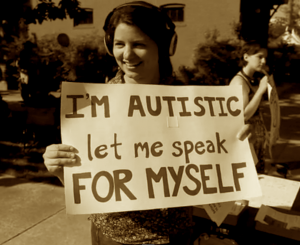Responding to comments in a recent San Francisco Magazine article AASCEND’s Board of Directors sent the following letter to the magazine, followed here by an accompanying press release.
UPDATE: Read San Francisco Chronicle writer Laura Shumaker’s blog about the AASCEND protest here.
 www.aascend.org
www.aascend.org
February 11, 2013
Mr. Steven Dinkelspiel
San Francisco Magazine
243 Vallejo Street
San Francisco, CA 94111
Re: Comments re: “Asperger’s behavior” in SF Magazine article by Mr. David Talbot on Tech Community
Dear Mr. Dinkelspiel,
We are members of the board of directors of the Autism Asperger Syndrome Coalition for Education, Networking and Development (AASCEND)—an organization of adults on the autism spectrum, friends and family, and professionals who work with them. We write now regarding statements about people with autism made in an article that appeared in San Francisco Magazine by Mr. David Talbot on “How Much Tech Can One City Take?”
Normally, we would not respond to statements made by individuals without expertise in the field. However, this article has achieved considerable attention, given the role of the tech community in San Francisco. Further, we note since the article’s publication you have made other corrections to it on your website.
In the article, Ms. Susan MacTavish Best is introduced as a prominent public relations executive, who is critical of the self-centeredness of San Francisco’s tech community. She denounces tech entrepreneurs as caring only about themselves. She is quoted as follows: “I will not tolerate people who think they can behave rudely just because they’ve been told their whole lives that they’re special. I think that sort of Asperger’s behavior, that super self-absorption, should be discouraged. I don’t care if you’re a Rhodes scholar and you just got VC funding for your new app, you still need to wash the dishes.”
Ms. MacTavish Best is entitled to her opinion. However, readers should be told that her opinion has no medical or psychological foundation. People on the autism spectrum are not defined by a selfishness or self-absorption. People on the spectrum differ widely in skills and characteristics—as widely as the general population. Some people on the spectrum do have difficulties in communication that may lead others to think them remote. But such difficulties are usually neurologically-based, and do not deserve the criticism of Ms. Best or others.
AASCEND was formed in part to combat misconceptions about people with autism and other neuro-diverse conditions. We would request you make note on the Magazine website carrying the article that Ms. Best’s claims are challenged by members of the autism community.
You can best reach us through our co-chairs … or through our website, info@aascend.org.
Yours,
[The AASCEND Board of Directors]
Press Release:
Adult Autism Group in San Francisco Responds to San Francisco Magazine article calling persons with autism “self absorbed” and “selfish”
The board members of the Bay Area’s Autism Asperger Syndrome Coalition for Education, Networking and Development (AASCEND), today issued a letter to San Francisco Magazine, challenging comments made in the Magazine describing persons with autism as “self-absorbed” and “selfish”.
The comments were made in an article by journalist and Salon founder, David Talbot, “How Much Tech Can One City Take”. In this article, Mr. Talbot introduces Ms. Susan MacTavish Best, a prominent public relations executive, who denounces tech entrepreneurs as caring only about themselves. She is quoted as follows: “ I will not tolerate people who think they can behave rudely just because they’ve been told their whole lives that they’re special. I think that sort of Asperger’s behavior, that super self-absorption, should be discouraged. I don’t care if you’re a Rhodes scholar and you just got VC funding for your new app, you still need to wash the dishes.”
AASCEND board members called on the Magazine not to allow this comment to go unchallenged. The board requested the Magazine to indicate on its website and further dissemination of the article that members of the autism community challenge this linking of self-absorption and self-centeredness with autism.
Mr. Gregory Yates, AASCEND Co-Chair explains, “It is unfortunately easy to confuse autistic social disability with self-absorption. Sadly, this common confusion does great harm to the many autistic people who, despite remarkable and relevant abilities, are much more likely to be washing dishes than being accepted in a high-tech workplace.”
Ms. Camilla Bixler, who serves as AASCEND Co-Chair along with Mr. Yates, states, “Autistic people have difficulties with social interaction and often with communication, not with being ‘self-centered’ or ‘selfish’. Autistics make heroic efforts to be included as respected and contributing members of our society, in spite of their neurologically-based challenges. As the mother of an adult autistic son, I urge people to learn the facts about autism.”
AASCEND was formed in part to combat misconceptions about people with autism and other neuro-diverse conditions.









